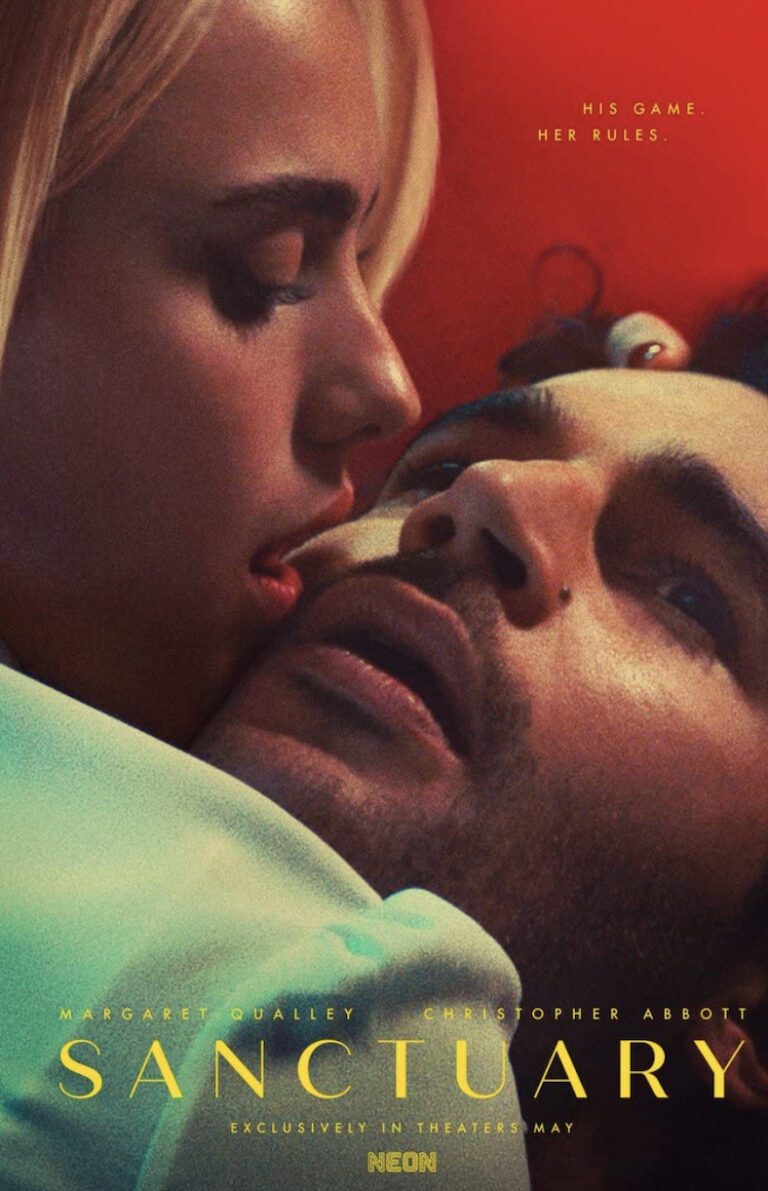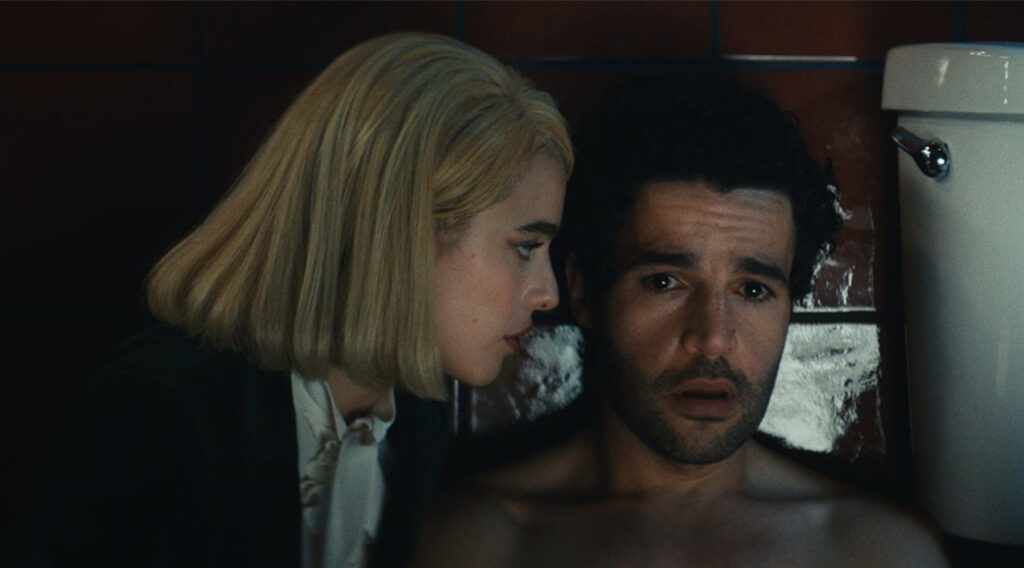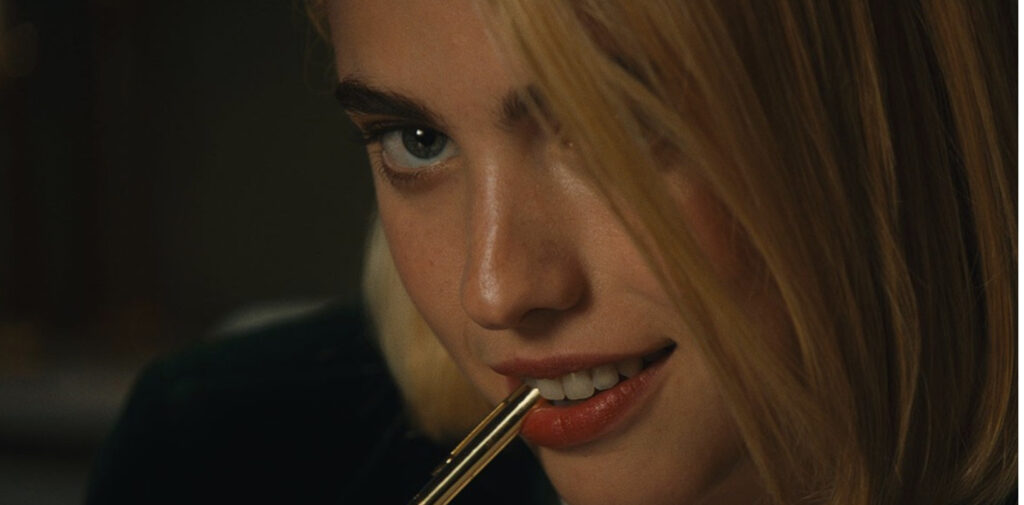
Synopsis : Set over the course of one night in a single hotel room, “Sanctuary” tells the story of a dominatrix (Margaret Qualley) and Hal (Christopher Abbott), her wealthy client. About to inherit his late father’s position and fortune, Hal tries to end their relationship, but when his attempt to cut ties backfires, disaster ensues.
Rating: R (Sexual Content and Language)
Genre: Comedy, Drama, Mystery & thriller
Original Language: English
Director: Zachary Wigon
Producer: Pavel Burian, David Lancaster, Ilya Stewart, Stephanie Wilcox
Writer: Micah Bloomberg
Release Date (Theaters): May 19, 2023 Limited
Runtime: 1h 36m
Distributor: NEON
Production Co: Hype Studios, Mosaic Films, Rumble Films (II), Charades

Q & A with Actors Christopher Abbott, Margaret Qualley and Director Zachary Wigon
Q: Here’s director Zach Wigon — why don’t you talk briefly about how you got involved in this project and developed your collaboration with writer Micah Bloomberg.
Zach: It was June of 2020. Micah and I were on the phone and he said, “I really would like to write some scenes. Why don’t we develop something together?” So I’ll write a few lines. I said, yeah, “Let’s do it.” For a number of years I’ve been interested in making a movie about dominatrix which makes for a good jumping off point for a film. The job of the dominatrix offers this really interesting paradox. I’ve come to the paradoxes and ironies, they tend to be good.
Sorry, I’m just getting thrown into this major end code. Push past it. The paradoxes and ironies tend to present good, foundational narrative elements for movies. The paradox with the dominatrix is that she simultaneously has the power over her clients and none of the power over her clients. I pitched this very vague idea to Micah — what if he had a dominatrix who, in the beginning, was also a client — a vague one-off thought. And he said, “well, I wrote a one-act play about a dominatrix with a client in a hotel room many years ago.” He had been circling a similar idea. We just started talking about it there and the story came from there.
Q: The movie obviously focuses on sexual fantasy and explicitly explores the fantasies and desires of the two main characters. Was that a conscious choice to cast [these] two ugly people?
ZW: I don’t know. I think they’re two good-looking actors. I’m not sure if I agree. Oh, interesting. Okay, so that’s what you were going for? Ahh, I got it.
Q: 98% of you knew I was kidding. 2% are like, “That’s pretty neat.” They’re obviously both gorgeous. You saw how they fit into the division you [set up].
ZW: I saw Margaret in “Once Upon a Time in Hollywood.” I was really amazed by the way that she used physical gestures and movements and that she had this electricity in the way that she moved on screen. She had this intensity in the way that she moved and her screen presence. I thought that she would be perfect for this character. At the same time, I’d also seen her in “Fosse/Verdon,” where she’s like 180 degrees different, playing a completely different kind of character with a lot of vulnerability, and you’re seeing deep into this character’s heart.
I just thought, “Well, she would be absolutely perfect for this. We needed someone who could play this broad, broad range of emotions and affects, and she has all those skills.” then with Chris… I’ve been a fan of Chris’s for many, many years, and seen him in all sorts of films. And one of the things that’s amazing about Chris in all of his work is he’s always kind of building these cross-sections of characters, where you see who the character is on the surface, but then at the same time you’re seeing all of the weight and the baggage and the different things that the character is carrying around inside themselves internally, while they’re trying to project something specific out into the world. That was exactly what we needed for this character for Hal. So yeah, they both just seemed perfect and turned out that they worked.
Margaret Qualley: Thanks, Zach.
Q: Obviously both super talented, both tremendous performances in the movie. Margaret, you were fantastic. So your character it’s just sequential. Or your character finds that she comes alive when she performs in the role that she is in the relationship.
MQ: Are you saying that I’m alive when I perform?
Q: Do you relate to that? If not, when do you feel the most you? When do you feel like you’re the you that you want to be?
MQ: Right now. I feel most me when I’m like doing me but I also really enjoy not having to do me. You know, it’s tiring, it’s exciting to be not me for a while. I mean, 60% of me is like, yeah, those were all sentences.
Q: I’m sorry, I was just like, just keep it moving. And she had an answer.
MQ: We all have these things that we’re comfortable with in our own way. It’s fun to do things that you wouldn’t necessarily be comfortable doing in a set of a day-to-day school. Right, with the script and taking that. we can explore that and that there’s you’re not going to lose your mind or people think you’re not so good.

Q: Great. That’s a good answer. Chris, so here’s a question. As an actor in show business, did you find it hard to have to play a character who likes to pretend to be other people and has powerful people doubt their abilities and jerks off at being told he’s worthless.
Chris Abbott: You know, art imitates art, I guess the short answer is I think so.
Q: And the long one?
CA: No, no.
Q: When you were playing Hal, which parts did you find easier to throw yourself into, that felt more natural? Which parts felt more discretion? How were you able to bridge the gap?
CA: Not to speak for Margaret too, but Margaret and I sort of think the same way. this one didn’t feel like character pieces as much as just commitment to the dialogue and filling in the in-between. I know this one didn’t feel like a character of necessarily what it’s trying to do. It’s sort of right there in Micha’s writing.
A lot of the “isms” that are all there are sort of written in. Micha’s a playwright, so there’s fine detail and, at the same time, just enough room between dialogue to sort of throw in idiosyncrasies or things that you come up with that we figured out on the day. Margaret and I would — within the framework of what Zach would set up with these very intricate, long takes — have to dance a little bit with the D.P. and do the scene within this framework. For Margaret and I, it was just a play and we tried different things — there was room to try things. That was the goal.
Zach: There were times where it really did feel like we were almost filming a play just in terms of the amount of pages that we covered in some of the setups. In the scene where they have dinner, for example, we flipped the 180, but for each side with the two cameras, we were running about six and a half pages of scripts in a take.
MQ: the whole movie was made in 18 days, which I imagine there’s a lot of people in this room that are making movies. It’s a fun movie to watch because it’s in one place. You know, and again, it’s so, they’re so inventive. It’s, you know, it’s such great writing and they’re really in the story that you’re attached to and it’s like a really reasonable movie to make.
Q: Talk a bit about being locked in one location. Obviously you have to get pretty creative with the camera work. There’s a couple of those 180 degree twists — what was your thinking behind each move and what were your thoughts going into this knowing you were limiting your space, limiting the actual real estate [you were working in]. Yet you wanted to tell a really deep and compelling story.
ZW: I’m trying to think where to start. I guess the first overall thought was to make sure that you don’t repeat yourself visually. You’re going to be in this 12 inches square foot suite with a basketball jar in the movie. You don’t want to repeat blocking and don’t want repeat setups. As a director, you want it to feel like you’re traveling somewhere visually. If you have shots in the movie, all shots at the beginning of the movie, you’re not going anywhere.
You have to travel somewhere, right? Make sure that it always feels like there’s constantly new images. The way that the images change over the course of the movie has to track the way that emotionally, beat-wise and psychologically the story and characters are changing. You’re always serving the script and the characters. You never want to be just doing your own thing. It’s a supportive part, a supportive job. That’s the overall mission.
Q: Sorry, there were more parts to the question.
ZW: Oh yeah, specifics? Obviously, you’re working within a very limited space, so you have to be pretty dynamic with the camera when you’re getting anywhere. For sure, you have to pick your moments for it. You certainly can’t do that stuff all the time, but sometimes, a lot of it’s intuitive. But there are certain moments, there’s a shot where it’s a close up on Chris, and then it inverts and goes across the room and it pushes in on Margaret and then it inverts again. That’s about power. Who has the power in this scene? Whose world is being turned upside down? Who is perfectly great? You can demonstrate these things visually. That’s what I took from the minute. So it’s fantastic, everyone’s fantastic.
Q: This question is more about the idea of fantasy and how these people find a rhythm in the bubble of this fantasy. This is for anyone. Do you think that it’s possible to connect in that way? Basically, when they leave the elevator, do you think they’re able to take that with them? They find a connection through the fantasy. It’s not really different from writing a character.
ZW: No, that’s not what I meant. I was imagining “The Office” — I was imagining Pam and Jim. I think there’s all sorts of different interfaces, whether it’s the internet or different, then you leave the bubble. Sometimes the way that girls in relationships are always challenged by not being encouraged. I think the last scene particularly signals what happens after the movie ends.
Check out more of Nobuhiro’s articles.
Here’s the trailer of the film.

